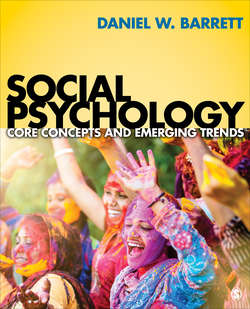Читать книгу Social Psychology - Daniel W. Barrett - Страница 114
На сайте Литреса книга снята с продажи.
The Psychology Of Social Thinking
ОглавлениеIn order to successfully navigate our complex social world, we must be able to make sense out of it. For most people, sense making has been seen as relatively uncontroversial, and the world was an objective reality that people could largely agree on. In other words, people generally believed that we “saw” objects, people, and events as they “really were.” However, with the advent of the “New Look” in cognitive psychology around the middle of the 20th century, psychologists began to explore ways in which our minds go “beyond the information given” and actually construct the world as we process it (Bruner, 1957). They recognized that our sensory processes do not passively funnel information to our mental systems but instead actively work on and change that information, in effect representing it in an altered form. As we further explore our mental processes in this chapter, we will highlight two of our four core assumptions of social psychology. One is the role of individual construal in perceiving and making sense of our social worlds. The second is the principle of the cultural embeddedness of social cognition—that is, how cultural background can influence basic reasoning processes.
The gyri of the thinker’s brain as a maze of choices. A gyrus is a ridge on the cerebral cortex. It is generally surrounded by one or more sulci (depressions or furrows).
Science Source.
As defined in Chapter 1, social cognition is the study of mental processes associated with making sense of oneself and others (Fiske & Taylor, 2013). These processes include both conscious and nonconscious thinking as well as perception, attention, and remembering (Moskowitz, 2005). These social cognitive processes are particularly relevant to three of our enduring questions of human nature: free will, rationality, and the self. For instance, we’ll discuss how apparently voluntary behaviors are affected by nonconscious, involuntary processes that may undermine our exercise of free will. We will also describe some of the biases in social cognition that lead us to question our ability to engage in rational or objective thought. In addition, we’ll describe some mental shortcuts that people take to save time and energy and how they can reduce judgmental accuracy. Not surprisingly, the self plays a central role in social cognition, in part because our interpretations frequently reflect our need to bolster the self, as we will discuss more in Chapter 4. As you would expect, this chapter focuses primarily on the individual level of explanation, although both evolutionary and contextual influences will be incorporated.
Thinking About People Versus Thinking About Things
People tend to think more about people than about things.
©iStockphoto.com/laflor.
©iStockphoto.com/PeopleImages.
